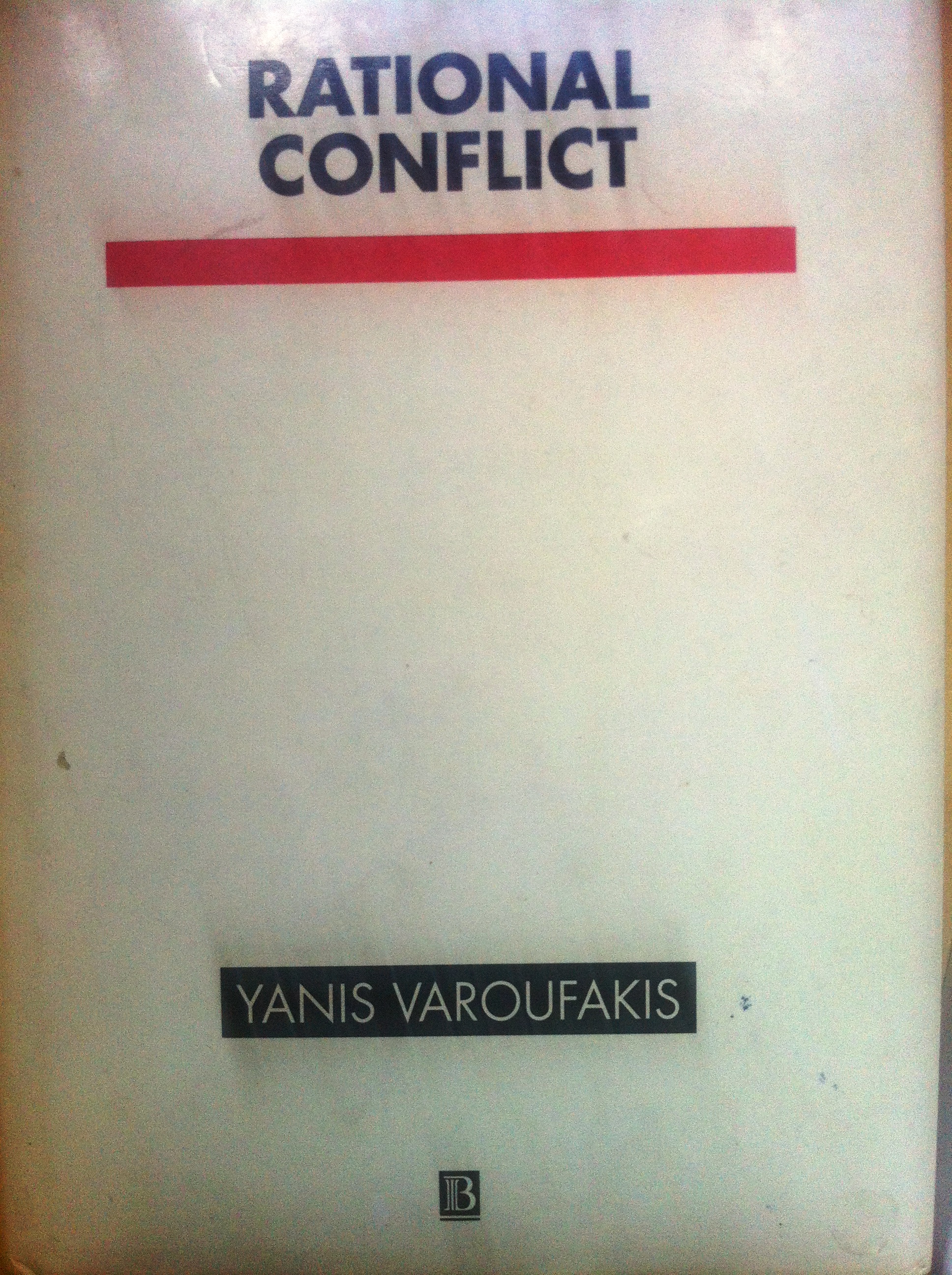 A brief history of Rational Conflict
A brief history of Rational Conflict
Rational Conflict was my first (single-authored) book. Its origins lie in my PhD thesis even though it shares not a single word with that document. The thesis was a typically dry microeconometric investigation of various parametric optimisation models of industrial strike activity.
Although intensely proud of my PhD thesis at the time, soon after I realised I did not want to publish it as a book. Indeed, within months I had laid it to rest on some dusty shelf never to be retrieved again. The reason was twofold:
- First, disillusionment with econometric analysis (once I grasped the enormous chasm separating that which we are actually testing from the theory we pretend to be testing). Secondly, because soon after completing my thesis I was taken with game theory and the following conundrum that it posed for anyone interested in conflict:
If we could have developed a brilliant theory of conflict, then the possibility of rational conflict (that is, of conflict between rational agents) would, necessarily, wither (as well-informed rational antagonists would have no reason to go through the motions of ‘fighting’).
This paradox struck me as an excellent opportunity to cast a critical gaze on the foundations of game theory in particular and neoclassical theory in general. Thus the seed of Rational Conflict entered my mind while I still lived in the UK (and taught at the University of East Anglia).
The actual book began to take shape after I moved to Sydney, Australia, in 1988. Thanks to the generosity of the Economics Department at the University of Sydney (they allowed me a lengthy teaching-free period right at the outset), I got down to work. The book saw the light of day in 1991 (Oxford: Blackwell).
As is often the case, Rational Conflict, being my first book, was written for myself, even though I was under the illusion (while writing it) that it was meant to appeal to large numbers. Soon after its publication I realised that only a handful of those who cared about the philosophical and political issues raised by the book also possessed the technical skills to follow the argument. Meanwhile, those who had the technical skills lacked the interest in the political philosophy of the enterprise.
Still, I was glad I wrote it thus confirming that I had, essentially, written it for myself. I suppose that we all deserve to write one book for ourselves. Nonetheless, at that stage I resolved that any future books would be readable by those whom they might benefit the most.
Dust cover blurb
Rational Conflict
Conflict is a disconcerting notion. It brings to mind war, strikes, discord and, to the horror of economists, inefficiency. These days, when social scientists are urged to adopt game theory in their pursuit of social explanation, a theory of conflict becomes a study in the failings of common sense or of communication difficulties experienced by agents. In any case, conflict is seen as a technical difficulty calling for a technical solution.
In this path-breaking book, Yanis Varoufakis rejects this perception as too impoverished. Starting with a demystification of game theory and using examples from industrial relations, diplomatic games, hostage crises and the law, he places its findings in a philosophical perspective and argues that there is a lot more to conflict than in immediately obvious. However disagreeable it may be within a popular culture, conflict possesses a creative edge and forms a crucial symbiotic relationship with Reason and Liberty that is in danger of being obscured if the sirens of game theory are heeded.
Table of Contents
Preface and Acknowledgements
Part I Preliminary Perspectives
Chapter 1 Introduction 3
Chapter 2 Reason and War
Reason’s narrow gate 15
Parametric and strategic perspectives 24
Fighting for freedom I 25
The enemy within 28
Conclusion 31
Part II Game Theory: Concepts and Critique
Chapter 3 Foundations of Equilibrium Conflict
The Leviathan trap 37Deliverance 41 Equilibrium reluctance 64 Conclusion 75
Chapter 4 War and Peace as Games
Inescapable Carnage 82 Logic’s backward march 90 Conclusion 100Chapter 5 Conflict by Agreement
Conditions for communication 104 Informational equity and consensus 113Information inequity: a chance for conflict? 129
Conclusion 136
Chapter 6 Conflict Beyond Equilibrium
The illusive paradox 141Counterfactuals and conditional probabilities 146
Mixed feelings, mixed strategies 151
Backward versus forward induction: the Cunning of Reason 159
Rationalizable conflict 173 Conclusion
Part III Reason, Conflict and Emancipation
Chapter 7 Praxis and the Self
The consequences of indeterminacy 185Dualism contra dialectics 195
Praxis and Sartre’s theatre: the struggle for self-realization 206
Erasure versus synthesis: the post-modern challenge 212
Conclusion 220
APPENDIX: Explaining conflict as an investment in lower risk aversion 224
Chapter 8 Social Conflict and Liberty
Beyond the cave 230The origins of solidarity I: coalitions, norms and evolution 236 The origins of solidarity II: history versus evolution 243 Fighting for freedom II 257
Conclusion 275 Bibliography 285
Index